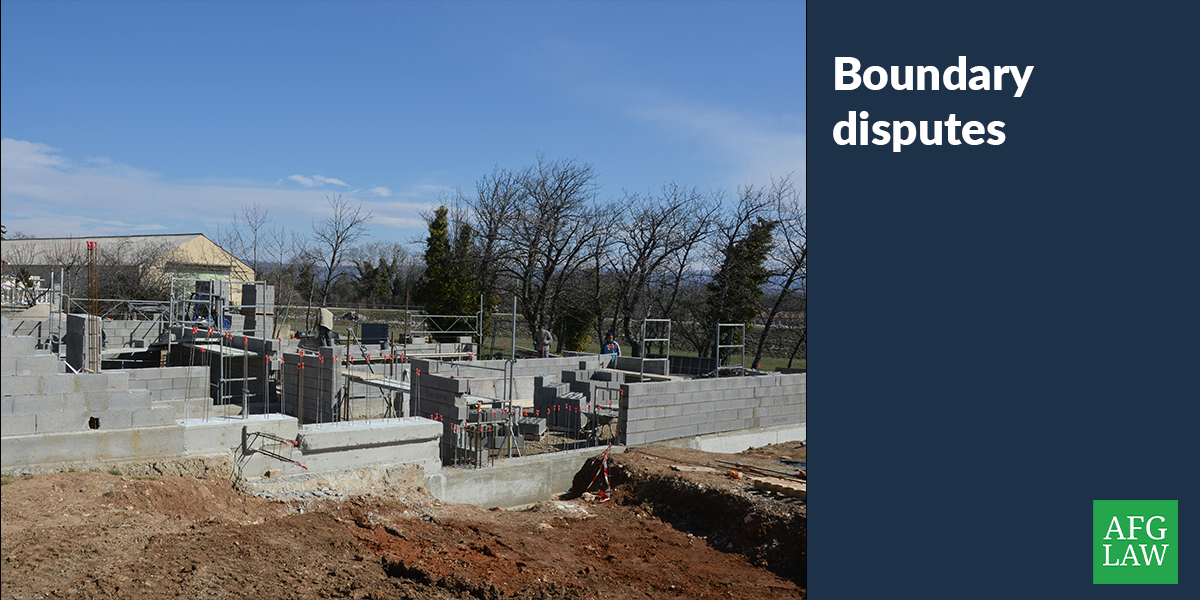Boundary disputes can be extremely distressing, especially if it is your first time experiencing one.
However, knowing where to start and who to contact first can help to speed up the process and reduce the overall costs and time spent on the dispute.
What is a boundary dispute?
A boundary dispute is a type of disagreement that arises between two owners of neighbouring properties.
A boundary dispute will usually arise when one party constructs a wall, fence or building that is perceived to overlap the other party's boundary, highlighting the different views neighbours have on their boundary lines.
First steps when dealing with a boundary dispute
When dealing with a boundary dispute, the first step you should take is to try and resolve this issue amicably with your neighbour. Creating a space for calm and constructive discussions is one of the best ways to identify common ground and establish what solutions may be possible.
However, if communication between you and the other party doesn’t seem to be working, you could try mediation. This is still another form of communication, but it involves an impartial third party to help find an agreeable solution through open discussions.
If neither forms of communication work, you will likely need to explore different ways to resolve the boundary dispute.

Ways that you can solve a boundary dispute
If open communication or mediation doesn’t work, don’t worry, there are other ways in which you can solve a boundary dispute, including:
Professional Surveys - Hiring an expert surveyor to conduct a comprehensive property survey can be a critical step when it comes to resolving a boundary dispute. This involves the assessment of historical events, physical markers and any other relevant evidence that can be used to accurately determine the exact boundary line.
The results of these surveys can help in assisting boundary disputes and they can be used in court as evidence if necessary.
Boundary Agreements - Once it has been established where the boundary officially lies, the next step is for the parties to enter a boundary agreement. This is a legal document that outlines the agreed property lines and any specific terms that relate to the use of land or maintenance. A boundary agreement will also provide a clear reference point if any future disputes arise.
Deed of Rectification - In cases where boundary disputes arise due to errors in property deeds, you might need a deed of rectification. This is a legal document that corrects any inaccuracies in the deed, helping to ensure that the property boundaries are reflected accurately.
Solving a boundary dispute without going to court
In some cases, a boundary dispute will have to go to court; but there are ways you can resolve a boundary dispute without court.
These include the ways we have previously mentioned, as well as:
Land Registry Dispute Resolution - In England and Wales, the Land Registry offers a service for boundary disputes that allows you to submit your evidence in regards to your dispute.
Arbitration - This is similar to mediation, however, once the arbitrator has reached their decision, both parties are legally obligated to follow it.
What evidence do you need to gather for a boundary dispute?
If you are currently in a boundary dispute, there are a few pieces of information that you will likely need to gather as evidence.
Evidence for boundary disputes can include:
Title deeds which include property descriptions, details of past transactions and the original conveyance.
Conveyancer documentation, including old files from solicitors involved in the original purchase of the property.
Surveyor reports
Photographs
Ordnance survey plans
Written statements
Historical legal disputes
Defending against a boundary dispute
Defending against boundary dispute requires gathering evidence, effectively presenting your case and understanding the legal process.
At AFG Law, we are experts in dealing with boundary dispute cases and can help you to defend against a boundary dispute by identifying the main issues, gathering relevant evidence and recommending the appropriate experts where necessary.
If you are currently looking at defending against a boundary dispute with a neighbour, get in touch with our team today to see how we can help you.
